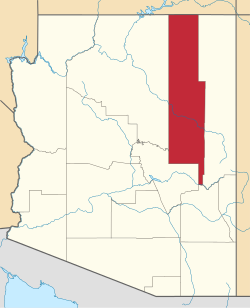Pinedale Ranger Station | |
| Nearest city | Pinedale, Navajo County, Arizona |
|---|---|
| Coordinates | 34°18′16.654″N110°14′47.245″W / 34.30462611°N 110.24645694°W |
| Area | 3 acres (1.2 ha) |
| Built | 1934 |
| Architect | USDA Forest Service |
| Architectural style | Bungalow/Craftsman |
| MPS | Depression-Era USDA Forest Service Administrative Complexes in Arizona MPS |
| NRHP reference No. | 93000510 [1] |
| Added to NRHP | June 10, 1993 |
The Pinedale Ranger Station is in the Apache-Sitgreaves National Forests, and located near Pinedale in Navajo County, Arizona.


